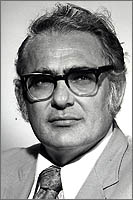Otto von Sadovszky
| Otto J. von Sadovszky | |
|---|---|
 |
|
| Born |
Otto Joseph von Sadovszky July 3, 1925 Hungary |
| Died | May 12, 2004 (aged 78) Orange, California |
| Nationality | American |
| Other names | Otto Joseph Rudolf Irene von Sadovszky |
| Education | UC Berkeley, UCLA |
| Occupation | professor, anthropologist |
| Years active | 1971-1994 |
| Employer | Cal State Fullerton |
| Known for | Cal-Ugrian theory |
| Notable work | The discovery of California: a Cal-Ugrian comparative study |
Otto J. von Sadovszky (July 3, 1925 – May 12, 2004) was a Hungarian American anthropologist who worked at California State University, Fullerton in southern California for most of his career until his retirement. He is best known for his linguistic work attempting to link Native American languages of California to languages spoken in Siberia.
Sadovszky was born in Hungary on July 3, 1925 and grew to maturity there during World War II. He and his wife Maria raised two children.
Sadovszky received his Ph.L. at Collegium Aloysianum in Italy.
After leaving Europe for the United States to study Sanskrit at UC Berkeley he met a graduate student in linguistics who was studying Miwok, and Sadovszky found that he could understand many of the terms from Miwok, a language of the Penutian group, despite having no training in it, due to the familiarity of many of the terms to Uralic languages from central Siberia he had studied earlier in Europe which were related to his native Hungarian. Sadovszky moved to Los Angeles to continue his graduate studies at UCLA.
Sadovszky taught in Germany, and in the U.S. at UC Berkeley, UCLA, and the University of Nevada, Reno before joining the Cal State Fullerton in Orange County south of Los Angeles in 1971. He continued working there until his retirement in 1994, even after achieving professor emeritus status in 1991.
During his tenure as professor of anthropology at CSUF he claimed to have proven that almost 80 percent of the languages spoken by 19 Indian tribes in California and two nations in Siberia are related. This became known as the Cal-Ugrian Theory.
...
Wikipedia
